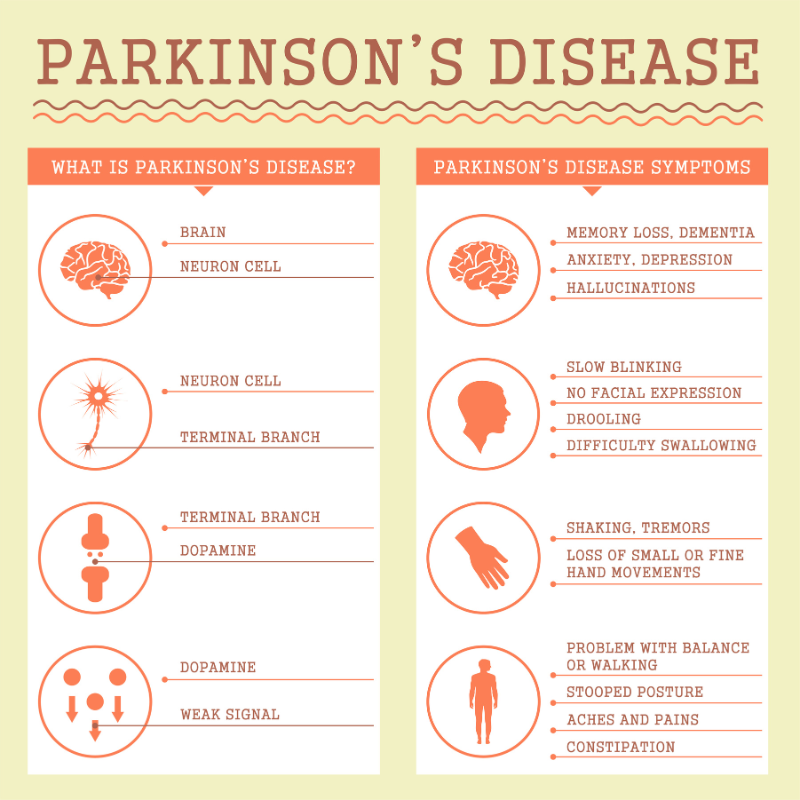 February 24, 2016
February 24, 2016
Parkinson’s Disease is generally known as an idiopathic disease, meaning that there is no known cause for the condition and it cannot be cured – though the symptoms can be managed, to some degree. There are four main types of Parkinson’s, though Primary Parkinson’s (the idiopathic variant) is the most prevalent – and those with Parkinson’s are shown to transition into dementia or Alzheimer’s Disease at a rate six times higher than the norm. If you care for an individual or family member and suspect that Parkinson’s may be present, keep an eye out for the following warning signs to self-diagnose the disease. Then, suggest to your loved one that they visit a qualified healthcare professional for a full diagnosis and treatment regimen.

Warning signs of Parkinson’s
Though some of these physical conditions may be related to other health concerns, these are the ones most commonly associated with Parkinson’s. Act quickly if you see any of these visible signs:
- Shaking or tremors – Those with a diagnosis of Parkinson’s Disease often remember the first time that they felt a twinge or tremor in their hand, lip, chin, fingers, or other extremity. If your loved one suffers from the occasional tremor or shake, make sure that you rule out any potential side effects from medications they’re taking, or investigate whether they’ve just completed a physically-exhausting workout. Medication and physical activity can trigger non-Parkinson’s related tremors in some individuals.
- Compact handwriting – This easy to detect side effect is commonly seen in Parkinson’s patients. Though handwriting size does generally change over time due to a natural stiffening of fingers and arms, a sudden change in handwriting size is cause for concern. Another visual indicator of a possible Parkinson’s diagnosis is a crowding of words on the page, irregular spacing of words, or a fluctuation in letter sizes within the same line.
- Sleep issues – Parkinson’s patients often report trouble sleeping. This is, in actuality, more often reported by the spouse or caregiver of a Parkinson’s patient as a general sense of physical restlessness when the patient is in a state of deep sleep. Some individuals will fall out of bed due to their movements, while others will alienate their spouse with sudden, frequent movements. While we will all experience a night of bad sleep every once in a while, too many nights strung together can indicate a more serious concern.
- Loss of sense of smell – If your loved one can’t smell as well as before, first take a look and see if they’re simply suffering from a common cold, sinus issue, or flu. If not, Parkinson’s may be the culprit. Numerous Parkinson’s patients have indicated that a loss of smell – especially, the ability to smell strong or distinct odors like vinegar or licorice, was an early sign of a problem.
- Constipation – As Parkinson’s is a degenerative disease that affects several systems within the body, the resultant muscular concerns related to Parkinson’s can interfere with the body’s natural ability to empty the bowels. This can manifest itself as constipation. While a bout of constipation is hardly enough to trigger a Parkinson’s diagnosis, it is one early warning sign that shouldn’t be ignored. If the patient is currently taking medications that can cause constipation, or they are not consuming enough fiber or water in their diet, that can be a cause for concern in itself – and one not related to Parkinson’s.
- Soft voice or tone – One of the best examples of this plays out in the public eye in actor Michael J Fox. Early acting jobs showcased Fox’s normal speaking voice and ability to alter his tone over a wide range of frequencies and volume levels. Recent acting work – many of them completed without the use of Parkinson’s medications, show Fox to possess a soft, subtle tone. Some people with Parkinson’s think that their loved ones are losing their hearing, but in actuality, the patient’s vocal control and overall volume tends to diminish over time.
What to do if you see these symptoms?
If you see any of these symptoms in your loved one, seek the guidance of a qualified neurologist. This professional will be able to more thoroughly diagnose your friend or family member and then prescribe a course of treatment. Help from an occupational therapist, speech therapist, or physical therapist can help to minimize the side effects of this debilitating disease, while regular exercise can make a real difference in mitigating Parkinson’s symptoms.



